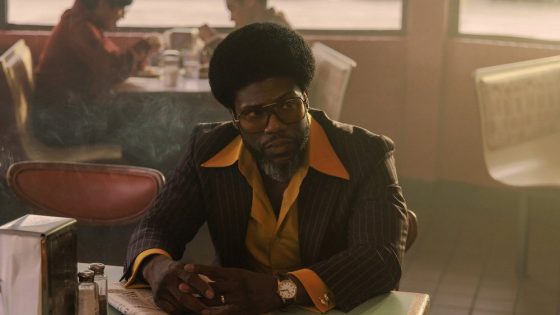Since the state of Georgia passed the nation’s most generous tax incentives for film and TV production, Atlanta has boomed into what’s often deemed the “Hollywood of the South.” But for all the shoots that use the city as a backdrop, there are few that actually center it as a dynamic metropolis worthy of its own mythology. (The list basically begins and ends with Donald Glover’s namesake FX series, and a handful of reality shows.) The Peacock limited series “Fight Night,” adapted by creator Shaye Ogbonna (“The Chi”) from the 2020 podcast of the same name, is a welcome break from this status quo, using a fateful evening in 1970 to explore Atlanta’s rise as a center of Black culture and prosperity — even if some of the architects of that ascent were less-than-savory characters.
But “Fight Night,” subtitled “The Million-Dollar Heist,” isn’t luring viewers in with the promise that it’s portraying, per its title card, “some shit that really happened.” The eight-episode limited series has one of the more star-studded casts this side of “Big Little Lies,” led by Kevin Hart and Don Cheadle as two men stranded between worlds. Hart plays Gordon “Chicken Man” Williams, a small-time hustler who hopes to impress Black Mafia boss Frank Moten (Samuel L. Jackson) by throwing an afterparty for Muhammad Ali’s comeback boxing match. Williams leads a double life represented by his two romantic partners: wife Faye (Artrece Johnson), with whom he attends church every Sunday, and mistress Vivian (Taraji P. Henson), with whom he engages in all kinds of under-the-table endeavors, chiefly illegal gambling. Cheadle portrays JD Hudson, a detective who started his career as one of the Atlanta police department’s first post-integration Black recruits. Hudson’s white colleagues are predictably prejudiced, while most Black Atlantans regard him as, to quote the show’s fictional version of Ali (Dexter Darden) when Hudson is assigned to his security detail, “an overseer.”
When a group of armed robbers attack Chicken Man’s party, robbing Frank and his fellow mob bosses, both protagonists are under serious pressure: Chicken to clear his name before the victims administer some vigilante justice, Hudson to tamp down the violence before it spins out of control. The Ali fight was meant to generate positive PR for a city on the rise, a trajectory Chicken hoped to cash in on by pitching Frank on a “Black Vegas.” Instead, the heist he’s been set up to take the blame for has generated all the wrong kinds of headlines.
“Fight Night” exists at the intersection of several TV trends with diminishing returns, from the mad scramble for true crime-adjacent IP to an escalating arms race for star power. But Ogbonna and co-showrunner Jason Horwitch have delivered an engaging, briskly paced series that uses a stacked roster to its full potential. “Fight Night” lacks the granular detail of more immersive Nixon-era period pieces like “The Deuce”; its soundtrack of shallow cuts, from The Temptations’ “Papa Was a Rolling Stone” to Darondo’s “Didn’t I,” reflects the broad approach to world-building. Yet “Fight Night” compensates for its workmanlike blueprint (true story + big names = profit) with nuanced ideas and engaging performances.
As Williams, Hart — also an executive producer — walks a fine line. The comedian is neither recycling his standard, silly persona nor is he overcompensating with a full dramatic turn. As a role, Chicken Man is well chosen for being an inherently ridiculous figure, scrambling for Frank’s approval while running innumerable schemes in the hopes of leveling up. But with his life, and his family’s, on the line, Chicken’s desperation takes on a more existential tone. It’s a subtle expansion of Hart’s range, not a forced one.
Virtually every other actor acquits themselves just as well. Henson, reunited with her “Hustle & Flow” and “Empire” collaborators Craig Brewer (who directs half the season) and Terence Howard (who portrays Frank’s ally, Jersey boss Cadillac Richie), gets a full box of toys to play with, from a riveting dance sequence to a mid-season makeover to some Cookie Lyon-esque animal prints. Jackson’s Frank is calmer and wilier than some of his other roles, though that trademark explosive rage lurks just beneath the surface. Cheadle lets Hudson loosen up gradually, from learning to respect and root for a “loudmouth” Ali to partnering with Chicken in an off-the-books mission to track down the robbery’s mastermind.
Our window into the stick-up operation is McKinley “Mac” Rogers (Sinqua Walls), a shell-shocked Vietnam veteran who signs on to afford a better place so he can share custody of his nine-year-old daughter. (Walls isn’t as famous as some of his co-stars, but his work helps imbue the series with a sense of tragedy.) The third episode of “Fight Night,” directed by Tanya Hamilton, plays out almost in real time as Mac’s crew seizes, then gradually loses control of a house party’s worth of high-profile marks. Such tense, riveting work makes up for the over-reliance on obvious vintage-coded devices like splitscreen elsewhere.
“Fight Night” keeps its focus on the life-or-death stakes that help the show maintain velocity throughout. But its characters are all united in a higher goal than mere survival. “I’m trying to be something bigger and better,” Henson’s Vivian exclaims. “Ain’t you?” Frank, like countless gangsters before him, wants to go legit; Hudson wants to make a difference; Chicken wants to make something of himself, whatever that looks like. “Fight Night” makes these desires convincing enough to use them as a proxy for an Atlanta on the cusp national prominence, driven by a Black elite. Selling that connection is an achievement in itself.
The first three episodes of “Fight Night” are now available to stream on Peacock, with remaining episodes airing weekly on Thursdays.
Source Agencies


